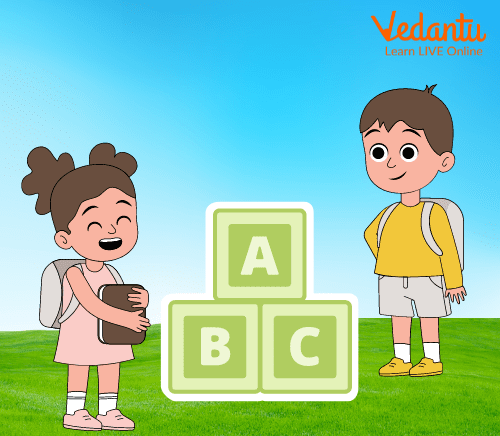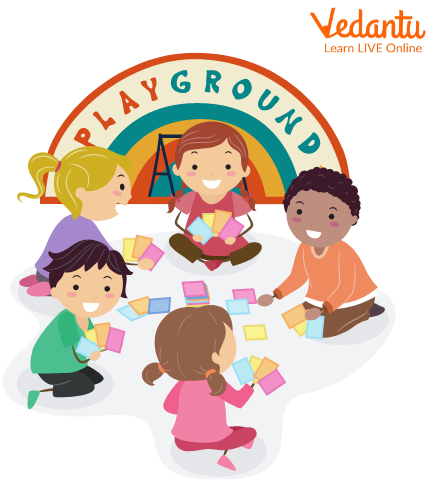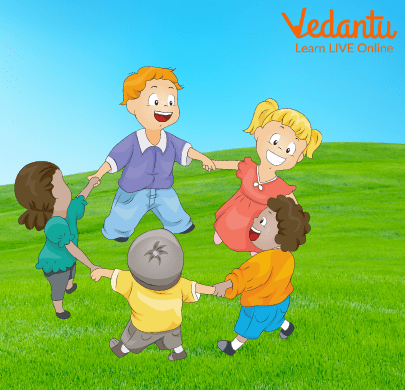Introduction to the Nursery Rhymes
What matters as a popular nursery rhyme for children? The ones that not only stick in your head but are also simple enough for a small child to wrap his tongue around with some practice. These nursery rhymes can be motivating ("Star Light, Star Bright"), humorous ("Three Blind Mice"), or even interactive ("This Little Piggy").

Nursery Rhyme
All of these nursery rhyme songs, however, have one thing in common: even the tiniest singers absolutely love them. Parents can show children wheels on the bus nursery rhyme videos or other nursery rhymes on the internet.
What are Nursery Rhymes?

Children Playing
Most nursery rhymes follow a similar plot to a happy ending with a fixed start and end. This teaches children that things happen in a certain order, and they begin to understand and follow along with stories. Nursery rhymes employ patterns and sequences, allowing children to learn basic math skills while reading aloud them. The wheels on the bus nursery rhymes and songs are very interesting rhymes to be learned by every student. The wheels on the bus nursery rhymes and songs also helps the kid to learn about different shapes and colour.
Importance of Nursery Rhymes

Children Learning Rhymes
The importance of nursery rhymes for kindergarten is essential for parents to understand fully. Nursery rhymes benefit preschoolers in various ways, not just in terms of reading skills. Some important advantages are listed below:
Nursery rhymes give limited learning opportunities for young children, and they can often be the main reason for hours of creative and open-ended play. They are a valuable early education source of information because they allow children to become interested in the rhythm and patterns of language.
Consider the rhyme in "A Sailor Went to Sea Sea Sea," the actual word in "Baa Baa Black Sheep," and the alliteration in "Twinkle Twinkle Little Star." Many nursery rhymes are also routine, which can help with memory development and listening and speaking practice. Famous nursery rhymes like wheels on the bus nursery rhyme videos. Let us learn wheels on the bus and more nursery rhymes now. Also, nursery rhymes the wheels on the bus lyrics are given to learn this beautiful rhyme.
1. Nursery rhymes the wheels on the bus

The Wheels on the Bus
Following are the nursery rhymes the wheels on the bus lyrics:
The wheels on the bus go round and round. Round and round. Round and round.
The wheels on the bus go round and round. Round and round.
The door on the bus goes open and shut. Open and shut. Open and shut.
The door on the bus goes open and shut. Open and shut.
The wipers on the bus go swish swish swish. Swish, swish swish. Swish, swish swish.
The wipers on the bus go swish swish swish. Swish, swish swish.
The horn on the bus goes beep beep beep. Beep beep beep. Beep beep beep.
The horn on the bus goes beep beep beep. Beep beep beep.
The people on the bus go up and down. Up and down. Up and down.
The people on the bus go up and down. Up and down.
The babies on the bus go, “Wah wah wah. Wah wah wah. Wah wah wah.”
The babies on the bus go, “Wah wah wah. Wah wah wah.”
The mommies on the bus go, “Shhh shhh shhh. Shhh shhh shhh. Shhh shhh shhh.”
The daddies on the bus go, “Shhh shhh shhh. Shhh shhh shhh.”
2. Twinkle, twinkle little star:
Following are the lyrics of Twinkle, twinkle little star, just like the nursery rhyme the wheels on the bus lyrics -

Twinkle Twinkle little star
Twinkle, twinkle, little star,
How I wonder what you are,
Up above the world so high,
Like a diamond in the sky, twinkle, twinkle, little star,
How I wonder what you are.
Easy Ways to Introduce Rhymes

Ring a Ring O Roses
Choose a simple rhyme to go along with one of your daily activities, such as a walk to the playground or a craft project.
Share rhyming picture books with your children.
Encourage your children to talk about the characters and events that unfold within the rhyme by sharing picture books of rhymes with them.
Popular Nursery Rhymes List
Following is the list of wheels on the bus and more nursery rhymes-
Alphabet Song
Bingo (B-I-N-G-O)
Baa Baa Black Sheep
Chubby Cheeks
Early to Bed
Five Little Ducks
Finger Family Song
Humpty Dumpty
Jack and Jill
Ring a Ring O Roses
Hey Diddle Diddle
Wheels on the Bus
Twinkle Twinkle Little Star
Hot Cross Buns
Summary
Modern technology has made children exposed to songs such as pop songs, theme tunes, and advertising jingles. However, young children have the capacity to learn repetition of songs and tunes, leaving plenty of room and opportunity for traditional nursery rhymes.


FAQs on Nursery Rhymes: The Wheels on the Bus
1. How do you begin a rhyme, and which nursery rhyme is the most well-known?
Songs, poems, and fingerplays are also excellent ways to introduce rhyming. Most children enjoy singing, listening to, and dancing to music. Simple finger plays work well with the youngest children. They're short, have rhyming words, and get the kids involved in the music.
Following are the famous nursery rhymes-
Twinkle, Twinkle Little Star. Twinkle, twinkle, little star.
Row, Row, Row Your Boat. Row, row, row your boat.
Humpty Dumpty. Humpty Dumpty sat on a wall.
Wheels On The Bus.
2. How do rhymes in nursery books help with language development, and what function do nursery rhymes serve?
Repeating rhymes and stories helps the brain develop memory skills and teaches how language functions. When learning new words and in reading comprehension, nursery rhymes help in the development of reasoning skills.
Children can learn important developmental skills in bite-sized portions through nursery rhymes, which more often serve as the motivation for endless hours of creative play. They help children develop an interest in the rhythm and patterns of language and are an effective early reading learning tool.
3. How do nursery rhymes promote language development?
Singing nursery rhymes or reading simple nursery rhyme books help children to develop speech and language skills. Rhyming words such as 'cat' and 'hat' encourage children to differentiate between similar sounds and letters and to develop phonemic awareness before they go to school.





